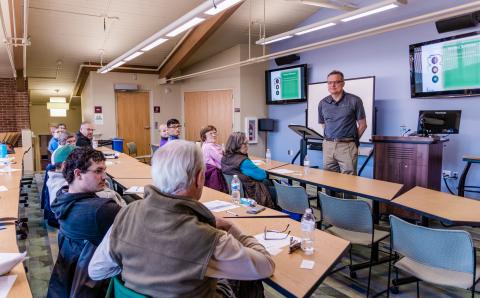A few years ago I was teaching part time in the theology department of a small German university. Germany is a deeply secular nation in many ways; the students I taught—all of whom were baptized Lutheran or Reformed members of the Landeskirche (state church)—were often patronizing toward Christianity. Most were studying theology as a purely academic interest and were sure that neither God nor the church were of much relevance today. “God has let himself be pushed out of the world,” remarked a student during a seminar, paraphrasing Dietrich Bonhoeffer’s famous (and elusive) remark made from prison. As a practical assignment, I had students visit one of the hundred immigrant congregations that have popped up in the bustling city of Hamburg over the past decade. These congregations are often African, thoroughly charismatic, and definitely not part of the Landeskirche. I was fascinated by the students’ impressions. It wasn’t just the energetic drumming and the evangelistic zeal of the sermons that struck them; it was that the worshipers were so obviously convinced of God’s reality and God’s relevance to their lives. One student in particular, I recall, was visibly shaken. She had never before encountered people for whom daily life was unthinkable apart from God.
How do we respond to people who think God is irrelevant to life?
In the United States and Canada, church attendance is declining and Christian cultural influence waning. But this isn’t the case globally, where religion is alive and well and Christianity in particular is vibrant and vital. People from every culture and nation on earth are experiencing God as real and relevant, the power that helps us face life’s challenges and the truth that calls us to live with integrity and love. I respond to the person who thinks God is irrelevant by insisting on God’s genuine relevance to everyone else in the world apart from that person. Obviously, this isn’t meant to mock them; it’s a tongue-in-cheek challenge to their assumption that feeling God’s absence is “normal.” It’s not! Perhaps it gets the person thinking along the lines of the student in my class: “If so many others find God relevant, why don’t I?”
True, to admit that God is relevant for othersdoesn’t necessarily show God is relevant to my life. How could we respond at this point?
As Christians, our experience of life is inconceivable without God. What older Reformed theology called a life coram deo (before God’s face) is winsomely described in the contemporary testimony Our World Belongs to God: “God is with us in our world, holding all things in tender embrace and bending them to his purpose. The confidence that the Lord is faithful gives meaning to our days and hope to our years. The future is secure, for our world belongs to God” (12).
We know further that even people who don’t acknowledge God still live and move and have their being in God (Acts 17:28). So the problem is not that God isn’t relevant to these people; it’s that God doesn’t feel relevant. This is typical of our secular age: It’s easy to think God is irrelevant because it often feels like God is irrelevant.
Perhaps the best way to respond to people who feel this way is not with an apology or argument but with a testimony of how we’ve personally experienced God as relevant. When have you sensed God’s goodness in your life or felt God’s guiding hand at a critical moment? Where have you been stirred by God’s love or troubled by God’s justice? The Psalms set a great example for us in declaring God’s everyday relevance: in the experience of the beauty of creation (Ps. 104), a purposeful life (Ps. 1), or deliverance in times of trouble—“If the Lorď had not been on our side when people attacked us, they would have swallowed us alive” (Ps. 124:2-3). By sharing our personal experience of God’s relevance, we can challenge others’ attitudes and stimulate their imaginations to see and feel what life is like when it’s experienced coram deo as it is for millions and millions of people in our world. Perhaps then they will even consider some reasons we might offer for why belief in God matters.
About the Author
Todd Statham is the Christian Reformed chaplain at the University of British Columbia (Okanagan Campus) and a research fellow at the Kirby Laing Centre for Public Theology in Cambridge.









